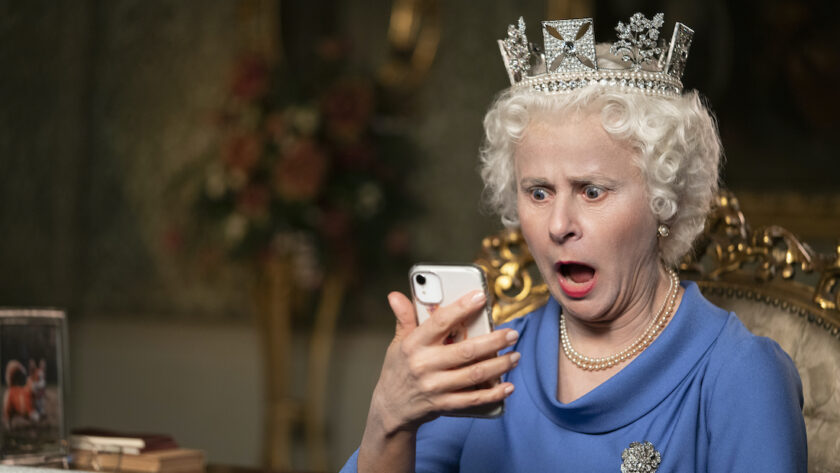Bryn Chiappe scrutinises modern satire and Charlie Brooker’s use of it in his Netflix mockumentary Death to 2020.
The Charlie Brooker-led Netflix film Death to 2020 begins with Samuel L. Jackson (as a character called Dash Bracket but essentially playing himself) sitting down in the familiar setup of the interviewee of a Netflix documentary. He is told that the film is a retrospective of 2020, a guide through and reflection on the events of an extraordinary year. Jackson’s response, “why the fuck would you want to do that?” is intended as a relatable tongue-in-cheek joke, but by the end of the film it’s a question that one wishes the creators had spent longer asking themselves.
There could have been several good answers to the question of what the point in making such a film is, but in this case it feels like there was none at all. The star-studded cast and their wacky characters deliver some good gags from time to time, but the jokes generally feel sloppy and bland. In most cases of one-off comedy specials this would be a disappointment. In the case of political satire it feels dangerous. Death to 2020 marks the most recent in a long line of sub-par satire since the political landscape of the West began its descent into the hyper-polarisation over the last few years. There’s a joke in the film about Gemma Nerrick (“one of the five most average people in the world”) thinking that there is a fictional TV programme called ‘America’ which is shown on the news channels. This is an appropriate recognition of the challenge the film faces in a world where real life has increasingly tended towards being stranger than fiction, but being aware of an issue and solving it are different things. It is not enough for the satirist to hold their hands up at a figure like Trump and say: “he does my job for me”. This all-too-common response is lazy, smug, and a complete discredit to the historically proven effectiveness of comedy as a means for political discourse.

The film does a convincing job of disproving the comedic rule that if a joke is repeated then it gets funnier. Joe Biden is old, Boris Johnson is stupid, and Donald Trump is orange are all gags that receive far more than their fair share of renditions. They occasionally merited a blow-out-of-the-nose laugh, but their use as the main jokes for numerous seismic political events grows to be incredibly frustrating from fairly early on in the film. Trump’s complexion is amusing. However, after four years of a tumultuous presidency that has regularly seen disturbing outbreaks of mass violence it seems poor work on the part of comedians that satire about him has stagnated into churning out this superficial point again and again. Aside from the laziness of this phenomenon in joke-writing, it is more importantly indicative of the fact that political figures like Trump use a method of performatively becoming a caricature. This has the effect of deflecting attention onto trivial jokes at their expense and away from their dangerous rhetoric or disagreeable policies. By taking this bait and running with it as the primary focus of their jokes, comedians are shifting the discourse into a much more comfortable place for the powerful figure.
Boris Johnson is another good example of a figure who evades any sort of powerful, insightful criticism in the film. This comes as no surprise after this many years of the British public and media finding jokes about his loveable buffoon characterisation more palatable than those concerning his ideology and policies. The fact that he is regularly referred to by his first name seems an apt exemplification of the success he has had in defining himself in the public eye foremost as a character rather than as a politician. It’s strange that comedy hasn’t adapted to him becoming Prime Minister. When Johnson was younger and a staple on programmes like Have I Got News For You it was forgivable that he was mocked for his larger-than-life personality instead of his politics, but in light of his rise to power the absence of more serious comedic criticism is a troubling one. There’s a quote from The Road to Wigan Pier that comes to mind when evaluating satire directed at him – “experience shows (vide the careers of Hitler, Napoleon III) that to a political climber it is sometimes an advantage not to be taken too seriously at the beginning of his career”. Comedy becomes powerful when it is undermining the seriousness with which a figure is demanding they are treated. In the case of Johnson, superficial jokes about appearance don’t do this because he is acutely self-aware and actively invites such comments. The power is taken out of laughter when you realise that the person you’re laughing at is in on the joke.

Those who take themselves deadly seriously and present themselves in the public eye as such are in a position to be taken down by a well-directed gag. In Death to 2020, this can be seen most effectively in the section concerning the Black Lives Matter protests and their international response. The posturing of brands and outpouring of comments from wealthy white people that had no purpose besides virtue signalling are rightly criticised in the film to strong effect. Despite the hypocrisy, it was nice to see a Netflix show put companies in the firing line for the general attitude around “asking themselves how they could support black people without actually paying them”. These targets are very much lacking in the self-awareness of the likes of Boris Johnson: there have been countless artificially earnest PR statements of big businesses claiming that they are ‘listening and learning’, and delusional woke white people as mocked by Joe Keery’s character, who drives around a black neighbourhood all day shouting at people through a megaphone that he “feels you and understands your pain”.
Like these groups, the conspiracy theorists of the world who have reared their ugly head in full force during the pandemic present a very strong opportunity for jokes that undermine the power of the group by highlighting their shortcomings. The jokes in this case don’t work very well not due to misguided attempts at what satire should be addressing, but merely because the poor writing of Cristin Milioti’s soccer mom character. Her scenes are the film at its most cringe-inducing American-style comedy; they are forced, awkward for the wrong reasons, and irritatingly predictable.
The film was often at its funniest when it didn’t intrude on the news clips themselves. This is not a compliment to the filmmakers but a recognition of the extraordinary situations we were treated to in the news this year. The various highlights of Trump’s public speaking were much funnier than the comments made about them, which usually took the form of acknowledging why an obviously funny clip was funny. It feels like box-ticking rather than searching for insight. 2020’s crown jewel of reality surpassing satire features in the film – Rudy Giuliani’s press conference from Four Seasons Total Landscape and Gardening was a piece of comedy gold that made The Thick of It look fairly bland in its plots. Perhaps the lesson to be learned from the failures of satire in recent years is that when the reality seems this satirical in itself, there is no need for the supporting jokes that are merely highlighting the obvious. The focus of the comedy should be directed at what isn’t immediately clear, shedding light on the less visible things that support and nurture such toxic political environments. A big part of this would be more genuine, intelligent criticism of the left and its leaders.

Satire shouldn’t always make the viewer’s laughter comfortable and at the expense of those on the other end of the political spectrum. The othering of Brexit voters and Trump supporters from voices on the left is counterproductive as well as reductive. It polarises the conversation and doesn’t allow for appreciation of the nuances that make up modern politics. There were some cases of progressives coming under attack in the jokes, but Joe Biden’s age being the defining point made about him over a seventy-minute special is a perfect of example of quite how far short the criticism fell. The only good example of attacks on the left was the section discussing the death of Ruth Bader Ginsburg, in which she was introduced as “a feminist icon and trailblazer who fought for abortion rights, gender equality, and a 600-mile gas pipeline through indigenous land.” Squirming a little upon hearing it, I wondered whether it was overly disrespectful to one so recently dead.
Regardless of where you stand on that question, I think that the squirm is a sign of what satire should be doing. Prompting conversation of whether a joke went too far is what comedians should be striving towards if we are to get back to a place where comedy is powerful. Satire should shock us into re-evaluating issues and figures. It should not pat us on the back and tell us that we’re right, nor should it reach for the lowest-hanging fruit. Hopefully the wave goodbye to 2020 can also be a wave goodbye to this trend in political comedy, but if Death to 2020 is reflective of the best that figures like Charlie Brooker can achieve then I’m not holding my breath on it.




